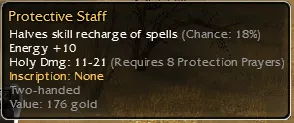Posts by PyroLobster
-
-
-
-
-
If a scythe can be a "weapon set" than the singular term "weapon" is moot and everything even holding a shield can be classified a "weapon set". Obviously this is stupid conclusion and common sense says a"weapon set" = weapon + offhand dispute gw using a silly 1 size fits all terminology. buuuuuuuuuut everybody just gona post single items now so who cares

-
-
Want to post something that doesn't fit in collection thread? Have a need to show off you're new shiny thing? Is you name Pleikki ?
This is the thread for you!
-
Set (noun) - a group of things of the same kind that belong together and are so used
-
-
-
-
100e GotH. Can you confirm mod order pls or better yet a nice screenshot

-
Pleikki The value of ur customized items to anybody that isn't you = 0
-
-
-
As high as buyer will offer and as low as seller will except. Or in this case 0 as seller wants more than anybody will ever pay. Maybe if a collector wins the lottery and PayPal's him $10k?
-
-
Dear OST,
"when a white q8 fellblade sells for 1500e, like it has in the past. this gold q8 perf shield atleast/should fetch 250a++ and more"
Item A = Fellblade (1500e)
Item B = Orante (250a+)
Pick up a calculator. Thats roughly 10x depending on how you factor armbrace value compared to ecto from an item sold in the past + whatever the "+" means in 250+.
You pick 250a out of nowhere then reference and unrelated item as justification for it. Then you add "And this is 2020 now and everything is more valuable/rare". That is not a price check its a guess and its worthless information.
Prices do not scale linear to rarity. Price is the result of the relationship between supply and demand. You didn't attempt to quantify either or reference past sales as a rough guide for future expectations.
Regards,
Pyro
**Mod Edit**
Stay civil, no flaming. Keep to the topic of the price check in hand. Forum rules.
-
OST logic:
Item A sold for x.
Therefore Item B should sell for 10x.
Item A and B are not related. Have different supply and demand ratios and will be sold at different times under different conditions.
**Mod Edit**
Stay civil, no flaming. Keep to the topic of the price check in hand. Forum rules.
-
-
Q9 Tac Spiked Targe +10 vs Plants, +30hp - 50e
-
-
Because when you collect something you want more of the same

-
-
but still, that one millisecond you see Q8 and its Gold, so satisfying.
(Then ofc its just misery and all ur dreams are broken)

Got this other day. Pretty satisfying dropping, IDing and looking up post nerf max dmg for hammer

-
-
-
Q4/11 bladed - 10e
-
-
-
-
Bone Idol - 5e
-
-
-
-

So this is max? staffs stats are so messed up
Kinda assuming its a mistake and 18% was suppose to max HRS for purple and Gold was to be 20%?
-
-
-
-
Skeleton - 100e



